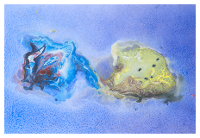Speaker
Volker Crede
(Florida State University)
Description
Nucleons are complex systems of confined quarks and gluons and exhibit the characteristic spectra of excited states. These states serve as an excellent probe of quantum chromodynamics (QCD), the fundamental theory of strong interaction. Highly-excited states are sensitive to the details of quark confinement, which is only poorly understood within QCD. This is the regime of non-perturbative QCD and it is one of the key issues in hadronic physics to identify the corresponding internal degrees of freedom and how they relate to strong coupling QCD. In recent years, lattice-QCD has made significant progress toward understanding the spectra of hadrons but many open questions remain, in particular on the role of gluons. On the experimental side, high-energy electrons and photons are a remarkably clean probe of hadronic matter, providing a microscope for examining atomic nuclei and the strong nuclear force. For more than a decade, laboratories worldwide have accumulated data for such investigations, resulting in a number of surprising discoveries and contributing to our understanding of the nucleon. Current experimental efforts in light baryon spectroscopy utilize highly-polarized frozen-spin (butanol) targets and deuterium targets in combination with polarized photon beams. These are important steps toward so-called complete experiments that will allow us to unambiguously determine the scattering amplitudes in the underlying reactions and to identify resonance contributions. In my talk, I will give an overview of the excited light-baryon program and a discussion of the experimental as well as phenomenological challenges.
Author
Volker Crede
(Florida State University)
